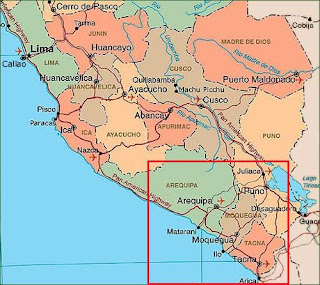XIV Sao Paulo Forum: Left parties debate the current historic conjuncture
By Inés Hayes, with reports from Montevideo by Cristina Camusso and Julio Louis.
Peru: Miners, Moqueguanos win victory following violent government attacks
By Carlos Quiroz, peruanista.blogspot.com
June 19, 2008 (updated June 26) -- The videos you are about to see are a bit shocking. For 18 months the people of the Moquegua region (southeastern Peru) and the mining workers from that region have been seeking for peaceful negotiations with the Peruvian government in Lima.
NATO's Balkan war and the Kosova liberation struggle
By Doug Lorimer
[The general line of this report was adopted by the June 12-14, 1999 DSP National Committee plenum. Text is taken from The Activist, volume 9, number 5, 1999]
On Wednesday March 24, 1999, the secretary-general of NATO, former Spanish social-democratic minister of culture Javier Solana, told a press conference: "I have just given the order to the Supreme Commander of Allied Forces in Europe, United States General Wesley Clark, to begin air operations against the Federal Republic of Yugoslavia."
The following day 371 NATO warplanes undertook bombing raids and six NATO warships in the Adriatic launched cruise missiles against targets in the Federal Republic of Yugoslavia.
Between March 25 and the cessation of NATO bombing raids on June 9, more than 30,000 combat missions had been flown by NATO warplanes against Yugoslavia. Thousands of civilians in Serbia have been killed or wounded. Millions of Serbian workers are now living without electricity, or water, or jobs. Factories, power stations, houses, hospitals, bridges and roads have been destroyed or damaged. The destruction of oil refineries and petrochemical plants have poisoned the air, rivers and soil of Serbia with toxic products. It has been estimated that the reconstruction of damaged or destroyed infrastructure will cost between $US15-50 billion.
The May-June 1968 revolt in France and its influence today (+ videos)
In May and June 1968, a movement erupted in France that threatened not just the survival of the government of President Charles De Gaulle but the system that it represented — capitalism. At the height of this movement, which was sparked by radical action by youth and students, an estimated 10 million workers were on strike and 600,000 students were occupying their schools and universities, and a further 2 million farmers were supporting them. This meant that more than one in five of France’s population were on the
Can carbon trading solve global warming?
Larry Lohmann, the Corner House, UK
By the International Socialist Organisation of Zimbabwe
* * *
June 23, 2008 -- After the publication of the original article (see below), Movement for Democratic Change presidential candidate Morgan Tsvangirai held a press conference at which he issued a statement to the effect that the MDC is pulling out of the presidential run-off election because conditions for a free and fair election do not exist, [due to the] the massive violence against his party and civic society. The press conference followed the disruption of his final rally in Harare by ZANU-PF vigilantes on June 22. Tsvangirai stated that the MDC was to carry out further consultations and would announce the details of the way forward.
We welcome the position taken by the MDC, and initial reports indicate that this position has been accepted by MDC and civic society activists and supporters.
Photo essay: Mexican indigenous front agitates for rights of migrants in the US
Text and photos by David Bacon
SANTIAGO DE JUXTLAHUACA, OAXACA, MEXICO
MAY 31, 2008 -- The assembly of the Indigenous Front of Binational Organisations in the Mixteca region of Oaxaca, one of the poorest areas in Mexico. A large percentage of the indigenous population of Oaxaca and other states has left to work in northern Mexico and in the United States. The FIOB is a political organisation of indigenous communities and migrants, with chapters in Mexico and the US. It advocates for the rights of migrants, and for the right not to migrate -- for economic development which would enable people to stay home.
Howard Zinn: An illustrated people's history of the US empire
Since its landmark publication in 1980, A People’s History of the United States has had six new editions, sold more than 1.7 million copies and been turned into an acclaimed play. More than a successful book, A People’s History triggered a revolution in the way history is told, displacing the official versions with their emphasis on great men in high places to chronicle events as they were lived, from the bottom up.
Malaysia: Fuel heats governmental crisis (+ videos)
June 21, 2008 – The National Front (BN) government led by PM Abdullah Badawi has been shaky since the March general election that returned a much stronger parliamentary opposition — now largely united in a new People’s Front (Pakatan Rakyat).
Bolivia's vice-president on the course of revolution
By Álvaro García Linera, vice-president of Bolivia
Translation, notes and introduction by Richard Fidler
Cuito Cuanavale: How Cuba fought for Africa’s freedom
By Barry Healy
Nicaragua: Anti-FSLN opposition seeks unity to topple Ortega government
By Felipe Stuart Cournoyer
